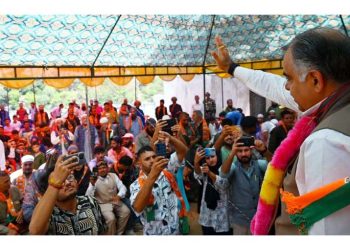The Centre on Monday introduced a bill in the Lok Sabha to check malpractices in government recruitment exams such as paper leaks and fake websites, with strict penalties including a minimum jail term of three years and a fine up to ₹ 1 crore.
At present, there is no specific substantive law to deal with unfair means adopted or offences committed by various entities involved in the conduct of public examinations by the central government and its agencies.
The Public Examinations (Prevention of Unfair Means) Bill, 2024, introduced by Union Minister of State for Personnel Jitendra Singh, mentions “leakage of question paper or answer key”, “directly or indirectly assisting the candidate in any manner unauthorisedly in the public examination” and “tampering with the computer network or a computer resource or a computer system” as offences done by a person, group of persons or institutions.
Besides these, “creation of fake website to cheat or for monetary gain”, “conduct of fake examination, issuance of fake admit cards or offer letters to cheat or for monetary gain” and “manipulation in seating arrangements, allocation of dates and shifts for the candidates to facilitate adopting unfair means in examinations” are also among the offences punishable under the proposed law.
“Any person or persons resorting to unfair means and offences under this Act shall be punished with imprisonment for a term not less than three years but which may extend to five years and with fine up to ten lakh rupees,” reads the bill.
A service provider, engaged by the public examination authority for the conduct of examinations, shall also be liable to be punished with imposition of a fine up to ₹ 1 crore “and proportionate cost of examination shall also be recovered” from it, according to the bill’s provisions.
Such service providers shall also be barred from being assigned with any responsibility for the conduct of any public examination for a period of four years, it says.
The bill defines a service provider as any agency, organisation, body, association of persons, business entity, company, partnership or single proprietorship firm, including its associates, sub-contractors and provider of support of any computer resource or any material, by whatever name it may be called, “which is engaged by the public examination authority for the conduct of public examination”.
The bill has provisions to identify and effectively deal with organised gangs, mafia elements and those indulging in malpractices. It will not even spare government officials found in collusion with them.
The bill makes “threatening the life, liberty or wrongfully restraining persons associated with the public examination authority or the service provider or any authorised agency of the government; or obstructing the conduct of a public examination” as a punishable offence.
No person or group of persons or institutions shall collude or conspire to facilitate indulgence in any such unfair means, the proposed law says.
The bill bars any person, who is not entrusted or engaged with the work pertaining to the public examination or its conduct or who is not a candidate, from entering the premises of the examination centre, with intent to disrupt the conduct of the test.
“Malpractices in public examinations lead to delays and cancellation of examinations adversely impacting the prospects of millions of youth,” reads the statement of objects and reasons of the bill.
The objective of the bill is to bring greater transparency, fairness and credibility to the public examination systems and to reassure the youth that their sincere and genuine efforts will be fairly rewarded and their future is safe, it said.
“The bill is aimed at effectively and legally deterring persons, organised groups or institutions that indulge in various unfair means and adversely impact the public examination systems for monetary or wrongful gains.
A candidate, which means a person who has been granted permission by the public examination authority to appear in public examination and includes a person authorised to act as a scribe on his behalf in the public examination, shall not be liable for action under the proposed legislation.
The bill shall serve as a model draft for states to adopt at their discretion.
“This would aid states in preventing the criminal elements from disrupting conduct of their state-level public examinations,” the objects and reasons of the proposed law states.
An officer not below the rank of Deputy Superintendent of Police or Assistant Commissioner of Police shall investigate any offence mentioned in the proposed Act, it says.
The bill covers recruitment examinations conducted by the Union Public Service Commission (UPSC), Staff Selection Commission (SSC), Railway Recruitment Boards (RRBs), Institute of Banking Personnel Selection (IBPS) and National Testing Agency (NTA) among others.
Ministries or departments of the central government and their attached and subordinate offices for recruitment of staff and any “authority as may be notified by the central government” for the conduct of government job recruitment are under the ambit of the proposed legislation.





































